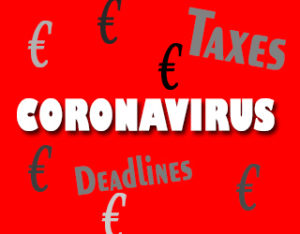TAX DEADLINES WITHIN THE STATE OF ALARM IN SPAIN
 Due to the actual crisis that has been declared in the whole world by the World Health Organization because of the Coronavirus (also known as Covid-19), almost every country has put into force different measures.
Due to the actual crisis that has been declared in the whole world by the World Health Organization because of the Coronavirus (also known as Covid-19), almost every country has put into force different measures.
*This document has been written according to the law and Decrees in force until 4th April 2020.
In Spain, the 14th March 2020, the government declared the “state of alarm” (regulated in Art. 116.1 of the Spanish constitution and the organic law 4/1981), for 15 days, (until the 29th March), through the Real Decree 463/2020, closing museums, monuments, restaurants and almost every business open to the public. Nevertheless, concerning the increase of the infections, the state of alarm has been extended for another 15 days until the 12th April 2020, after the approval of the Parliament ( Congreso de los Diputados, Decree 11/2020), and pending for another extension until the 26th April.
The main goal of these decrees is to prohibit free movement of people in order to prevent further increase of infection among the Spanish population. Nevertheless, all these measures have economical, fiscal and, of course, social consequences.
Extension of the payment dates for self-employed and small entrepreneurs (PYME) (Deferral and split payments).
- Self-employed and small entrepreneurs with a turnover of less than € 6.010.121,04, are allowed to defer payment of the tax debt (less than 30,000 euros) without the need to provide a guarantee for a 6-month term. The first three of these months will not accrue default interest, with the consequent. Said deferral only refers to settlements or self-assessments that had to be presented or entered from March 13th to May 20th of 2020 (article 14 Decree 7/2020).
- A postponement of tax debts that previously could not be postponed is now allowed (article 65 LGT):
- Those that the person is required to make payments on account for (art. 65.2 b), such as the quarterly model 111 or the 3% model Modell 211.
- Those derived from taxes that must be passed on by law having been collected (art. 65.2 f), such as model 303 of VAT
- Fractional payments of Corporation Tax. (art. 65.2 g), such as IS model 202
Suspension of legal terms not concluded before March 14 (Decree 8/2020 and 11/2020)
Article 33 of Royal Decree-Law 8/2020 and its clarification with Decree 11/2020 applies to all taxpayers, extending the deadlines not concluded before March 14, 2020, until April 30 2020 for:
- The payments of tax debt for liquidations in the voluntary period and those that, in the executive period, have been notified of the enforcement order. For example: if you have been notified of a settlement for the payment of a tax debt on March 12 you would have to pay it no later than April 20 (according to the General Tax Law in its article 65.2), however, with this decree the payment can be postponed until April 30.
- Deadlines and fractions of deferrals already granted (prior to March 14, 2020 without prejudice to the deadlines reflected in art. 14 of the previous Decree 7/2020), as well as the deadlines on auctions and adjudication of goods made by the Treasury state.
- Deadline to meet the state agency requirements, embargo proceedings, requests for information or to make allegations in tax procedures (regarding nullity, rectification of errors, requesting returns).
- If there was doubt as to whether or not these tax procedures initiated by the corresponding autonomous and local Administration, the new Decree 11/2020, in its article 53, establishes that the suspension of the aforementioned period also applies to local and autonomous administration (in the art.33 of decree 8/2020).
- Deadlines to meet requirements and requests of the cadastre.
- No proceedings to execute the guarantees already seized which fall on real estate in the administrative procedures of constraint
What happens with the procedures communicated as of March 14?
For all the aforementioned procedures communicated as of that date, they are extended until May 20 of 2020 (unless the one granted by another tax rule is higher).
For example: if a settlement for the payment of a tax debt was notified on March 19, in normal cases you would have to pay it no later than May 5, however, with this decree, payment can be deferred until May 20.
However, in any of the above assumptions, if the taxpayer complied with the requirement, paid the tax debt or presented allegations despite the deferment granted, they will be understood to have been carried out for all purposes, procedure completed.
What happens with self-assessments such as the payment of Property Transfer Tax in the sale of a home?
When a person buys a home in Andalusia, they have 30 days to pay the Property Transfer Tax, which is currently 8% of the purchase price. The payment of the same is done through a self-assessment. In other words, the buyer or his/her representative prepares this tax model and presents it voluntarily for payment within that period.
The decree regarding the state of Alarm does not include self-assessments as deferrable, according to Royal Decree 465/2020, of 17 March, amending Royal Decree 463/2020 of 14 March, declaring a state of alarm, so for example, neither the quarterly settlements of VAT nor personal income tax (models 130 and 303) are postponed and maintains their deadline for April 20 for the third quarter.
What happens during the state of alarm with the legal term of actions that tax authorities can exercise against someone and the deadlines for filing appeals?
Royal Decree 11/2020 establishes that the period from March 14 to April 30, will not count for the purposes of prescription in the actions that the tax administration may exercise against the administered.
Let’s take an example, if the administration had a maximum period until March 19 to demand payment of a tax, and it has not been demanded by March 13 the administration automatically has until April 30 to request payment.
There would neither be a deadline for the expiration of the procedures initiated by the administration.
On the other hand, the deadlines for the filing of administrative economic appeals against tax acts or in the economic-administrative procedures not notified before March 14, 2020, do not start until after April 30, 2020.
What happens with the income declaration from rentals or the annual IRNR declaration for non-residents?
These deadlines do not vary, meaning that all non-residents in Spain receiving an income from rentals of a property here in Spain must declare said profit quarterly within the corresponding period.
Author: Guillermo Arenere Ruiz, lawyer at C&D Solicitors, Torrox (Málaga, Andalusia)










